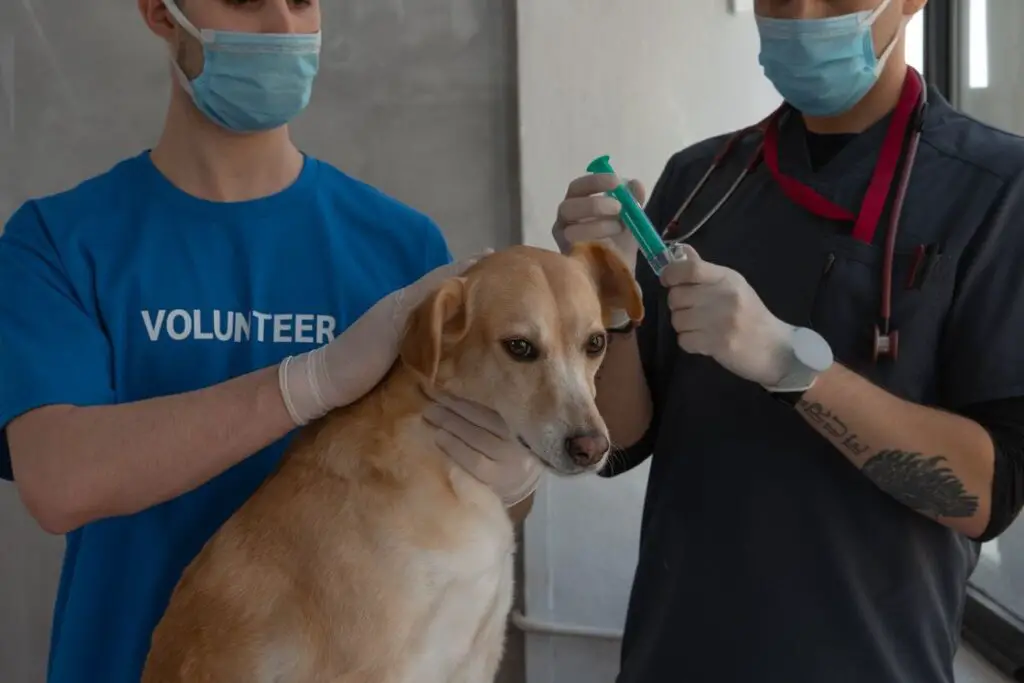What happens if you over vaccinate your dog? In this article, we will offer answers to assist you in making judgments about your dog’s immunization requirements.
For good reason, many dog owners are concerned about the possible effects of over-vaccination. They want to ensure their dogs get the protection they need without endangering their health. Our knowledge of veterinary medicine allows us to clarify this situation and offer advice.
Contents
What Happens if You Over Vaccinate Your Dog?
Over-vaccinating a dog can have unintended consequences on their health. Exposing pets to excessive vaccines can strain their immune systems and lead to adverse reactions. While they are designed to strengthen the immune response, overloading the system can weaken it and compromise the dog’s ability to fight off infections.
This overload can cause various issues, including allergic pet reactions, autoimmune disorders, and neurological problems. Here are some of the most common adverse effects of over-vaccination:
- It can increase the likelihood of adverse effects of vaccines. Although these are usually mild and temporary, they are annoying.
- It can strain a dog’s immune system, leading to dysregulation or overstimulation. This can manifest as autoimmune diseases or other immune-related disorders.
- In rare cases, particularly with certain types of vaccines, it can increase the risk of vaccine-related sarcomas, a type of cancerous tumor. These tumors typically develop at the vaccination site and may require surgical intervention.
- It may contribute to long-term health issues, including chronic inflammation, organ dysfunction, or an increased susceptibility to certain diseases.
Some dogs may be more susceptible to adverse reactions due to their breed, age, or pre-existing health conditions. Therefore, pet owners must work closely with my Care Animal Hospital veterinarians to develop an individualized vaccination schedule considering their dog’s needs.
Why Is It Important to Work With Your Veterinarian?
Maintaining open communication with me is vital for ensuring the health and well-being of your dog. Building a solid partnership with me allows us to provide personalized care and informed vaccination decision-making.
When developing a vaccination plan, we will consider your dog’s unique needs, lifestyle, and potential exposure risks. We will assess the dog’s health history and discuss any concerns or questions you may have. This collaborative approach ensures that your dog receives appropriate vaccinations while minimizing over-vaccination risk.
Regular examinations and wellness visits allow our veterinarians, at Care Animal Hospital, to monitor your dog’s health and adjust the vaccination schedule as needed. When working with your veterinarian, consider the following additional information:
- Discuss any previous adverse reactions or allergies your dog may have had to vaccines.
- Inform your veterinarian about recent changes in your dog’s lifestyle, such as exposure to new environments or contact with other animals.
- Seek their advice on potential vaccine exemptions or titer testing, which can help determine the need for additional vaccinations based on your dog’s immunity levels.
What Are the Signs of Over-Vaccination?
Dog owners must be aware of the signs indicating over-vaccination, or multiple vaccinations in their pets. If you notice any concerning symptoms, it is essential to contact me promptly. Signs of over-vaccination can vary depending on the individual dog and their immune response. Common symptoms may include:
- Lethargy
- Loss of appetite
- Fever
- Vomiting
- Diarrhea
- Swelling or itching at the injection site
If your dog has a history of adverse reactions to vaccines or has pre-existing health conditions, monitoring their response closely is even more critical. I can help assess the situation and determine whether adjustments to the vaccination plan are necessary.
When in doubt, it is always better to err on the side of caution and seek veterinary guidance. A good veterinarian should have the expertise and knowledge to assess your dog’s condition and provide appropriate recommendations. They may suggest alternative vaccination options or adjust the schedule to ensure your dog’s safety and well-being.
What Is the Importance of Proper Vaccination Practices?
To ensure the well-being of their furry friends, pet owners must understand the right approach to vaccinations. Following veterinary guidelines and recommendations is crucial in achieving the optimum level of protection without subjecting dogs to unnecessary risks. Vaccine protocols established by our veterinary professionals are based on extensive research and expertise.
These guidelines consider the prevalence of diseases in specific regions, the dog’s age, lifestyle, and overall health status. A crucial aspect of proper vaccination practices is adhering to the recommended vaccination schedule. Vaccines are typically administered in series, allowing the dog’s immune system to develop a robust response over time.
In recent years, veterinary medicine has made significant advancements, leading to the development of vaccines with longer durations of immunity. They have allowed for extended intervals between vaccinations. That’s why I make an effort to stay up to date on these advancements and tailor vaccination plans accordingly to provide the best care for your pets.
Related Questions
At What Age Should You Stop Vaccinating Dogs?
The appropriate age to stop vaccinating dogs may vary depending on factors such as the dog’s health, lifestyle, and local disease prevalence, yet generally, core vaccinations are typically administered until around sixteen weeks of age, followed by booster shots for dogs at one year. Consult with our veterinarians for specific guidance tailored to your dog’s needs.
Can I Restart My Dog’s Vaccines?
Yes, with our veterinarians’ guidance, at Care Animal Hospital, you can safely restart your dog’s vaccine schedule if doses were missed or incorrectly administered. They will tailor a catch-up program based on your dog’s age, health status, and lifestyle.
Can I Give My Dog Three Vaccines at Once?
Administering three vaccines to a dog at once can overwhelm its immune system and increase the risk of adverse reactions. Following a vaccination schedule that spreads the vaccines over multiple visits is generally recommended, allowing the immune system to respond effectively and minimizing potential complications.
Conclusion
Ensuring your dog’s health is a priority, and vaccinations play a crucial role in achieving this goal. However, it is equally essential to avoid over-vaccination, as it can have adverse effects. By working with us, you can provide your furry friend with the best protection while minimizing potential risks.



